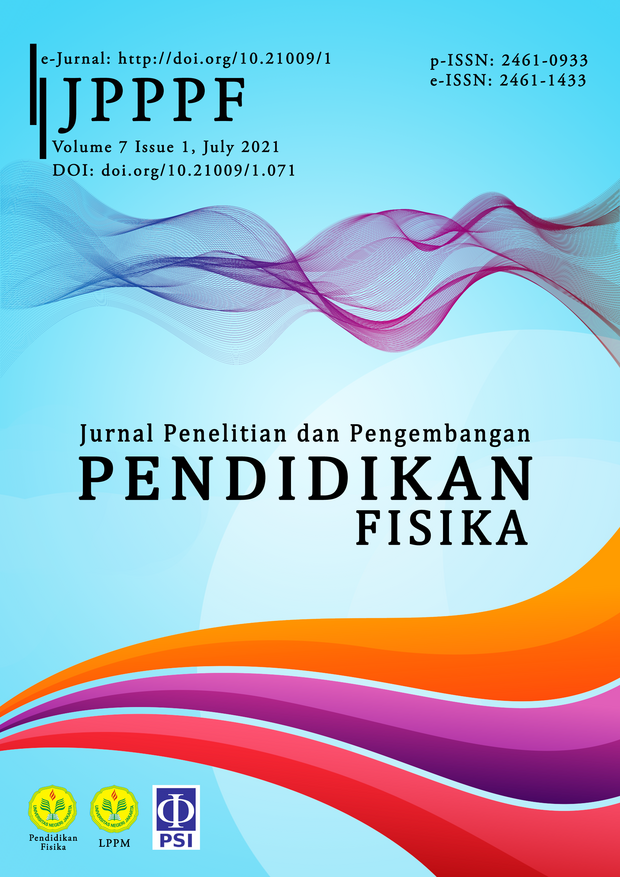Learning Media Development using Transformative Learning Strategy Android Application as a Distance Learning Support on Static Fluid
DOI:
https://doi.org/10.21009/1.07107Keywords:
android application, transformative learning, distance learning, static fluidAbstract
This research aims to develop and produce an Android application using a Transformative Learning Strategy as a Distance Learning on static fluid material. The research used Research and Development (R&D) method, which refers to the Dick and Carey model. The instrument was a questionnaire using a Likert scale and analyzed with a continuous line. According to media experts, this Android application had a validation test phase with a successful percentage of 96% according to matter experts and 80%. According to learners, this application trial was conducted to 30 students of class XI MIPA and physics educators/teachers at SMA Negeri 109 Jakarta with a percentage achievement of 77% according to educators and 83.21%. Based on these results, the data showed that the Android application using Transformative Learning Strategy as a Distance Learning on static fluid material is suitable media for learning physics.
References
Abdul, UL & Berti, Y 2019, ‘Pengembangan Aplikasi berbasis Android yang Terintegrasi dengan Website sebagai Media Pembelajaran Biologi’, Jurnal Bioterdidik, vol. 7, no. 5, pp. 33 - 42.
Akdon, R 2007, ‘Rumus dan Data dalam Apikasi Statistika’, Alfabeta, Bandung.
Ali, T 2019, ‘Perspektif Tentang Perkembangan Sistem Pembelajaran Jarak Jauh di Kabupaten Kutai Kartanegara Kalimantan Timur’, Jurnal Pendidikan Riset dan Konseptual, vol. 3, no. 2.
Asep, H 2020, ‘Mengenal E-learning’, Retrieved from IPI, Viewed 5 April 2020, http://www.ipi.or.id/elearn.pdf
D, DN, S, K & H, W 2020, ‘The Exploration Of Mechanistic Reasoning Ability For High School Students In Static Fluids’, Journal of Physics: International Conference on Sciece Education and Technology.
Depdiknas 2003, ‘Undang-undang RI No.20 tahun 2003 tentang Sistem Pendidikan Nasional’, Balitbang, Jakarta.
Fatur, R, Hum, M, S, A & Yuliati 2014, ‘Character Education For Golden Generation 2045 (National Character Building for Indonesian Golden Years)’. Procedia - Social and Behavioral Sciences, vol. 141, pp. 1161-1165.
Hardika 2014, ‘Model Pembelajaran Tranformatif Berbasis Learning How To Learn untuk Peningkatan Kreativitas Belajar Mahasiswa’, Madrasah, vol. 6, no. 2, pp. 12.
McGonical, K 2005, ‘Teaching for Tranformation: From Learning Theory to Teaching Strategy’ dalam Newletter’, Center for Teaching and Learning, vol. 14, no. 2.
Moore, M & Kearsley, G 1996, ‘Distance Education: A System View’, Wadsworth Publishing Company, Belmont.
Muliyati, D, Rahmah, A, Sunaryo, and Susanti D 2021, ‘The development of Android-based physics teaching materials on static fluids’, AIP Conference Proceedings, vol. 2331, p. 030038.
Munir 2017, ‘Pembelajaran Digital’, Alfabeta. Bandung.
Muyaroah, S & Fajartia, M 2017, ‘Pengembangan Media Pembelajaran Berbasis Android’, Innovative Journal of Curriculum and Educational Technology, vol. 6, no. 2, pp. 79-83.
Purbasari & Julia, R 2013, ‘Pengembangan Aplikasi Android sebagai Media Pembelajaran Matematika pada Materi Dimensi Tiga untuk Siswa SMA Kelas X’, Jurnal Online Universitas Negeri Malang, vol. 1, no. 4.
Qowiyyun Dyahesita, PA, A, W 2019, ‘Analisis Pemahaman Konsep Fisika Siswa Pada Pokok Bahasan Fluida Statis’, Jurnal Ilmu Fisika dan Pembelajaran, vol. 3. no. 2.
Saihu & Baeti, R 2019, ‘Pembentukan Karakter Melalui Model Pendidikan Transformasi Learning Pada Santri Di Pondok Pesantren Nurul Ikhlas Bali’, Pendidikan Islam, vol. 8, no. 2.
Tony, B & Marcia, C 2015, ‘The New Social Learning’, 2nd Edition: Connect Collaborate, Work. ATD Press, New York.
Tsania Nur Diyana, SS 2020, ‘The Analysis of Student Difficulties in mastering static fluid concept’, Momentum: Physics Education Jurnal, vol. 4, no. 1, pp. 11-18.
Yıldırım, M & Yelken, TY 2020, ‘The Development of Transformative Learning Scale for Information and Communication Technologies’, Tech Know Learn, vol. 25, pp. 989–1006.











